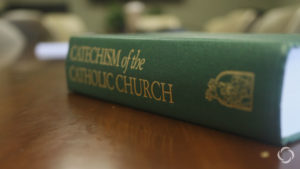For a Doctrinal Homily Outline for the Fifth Sunday in Ordinary Time, click here. Its focus is on the natural virtue of optimism and the theological virtue of hope.
A final book or author I have found especially helpful is the Catechism of the Catholic Church. As a writer about Catholic things, the Catechism is a go-to source for almost everything.
As you probably know, the 2865 points of the Catechism are divided into four major parts:
I. The Profession of Faith (organized around the Creed)
II. The Celebration of the Christian Mystery (organized around the Liturgy and the Seven Sacraments)
III. Life in Christ (organized around the Ten Commandments) and
IV. Christian Prayer (organized around the Our Father)
If I had to pick a favorite point in the Catechism, it would be the very first, which magnificently summarizes Salvation History:
God, infinitely perfect and blessed in himself, in a plan of sheer goodness freely created man to make him share in his own blessed life. For this reason, at every time and in every place, God draws close to man. He calls man to seek him, to know him, to love him with all his strength. He calls together all men, scattered and divided by sin, into the unity of his family, the Church. To accomplish this, when the fullness of time had come, God sent his Son as Redeemer and Savior. In his Son and through him, he invites men to become, in the Holy Spirit, his adopted children and thus heirs of his blessed life.
The main difficulty I find in reading the Catechism as a student has to do with the kind of book it is. A discovery I have made about non-fiction writing or speaking is that there are only four basic “moves.” The first is making a claim (a truth statement made in abstract language). A second is to explain that claim in other abstract language. A third is to present concrete examples or illustrations. And a fourth and final is to tie back the example to the claim, that is, explain how this example supports the original claim (this is both concrete and abstract). It is up to the writer or speaker if and when to use explanations, illustrations, and tiebacks (or to omit them).
So, the difficulty in reading the Catechism is that it is largely claim after claim after claim. This makes sense because the Catholic faith contains many, many truths. But claims are by their nature made in abstract language. So, this kind of reading or listening takes sustained concentration and can tire out your brain.
This is why I think a homilist could preach a full sermon on just one Catechism point, provided he repeated the point, explained it in different ways, and provided many kinds of examples. I suspect that this was why in his own preaching Our Lord created so many genius-level parables and performed miraculous “signs” (as in John’s Gospel) to help us understand his teachings.


Leave a Reply